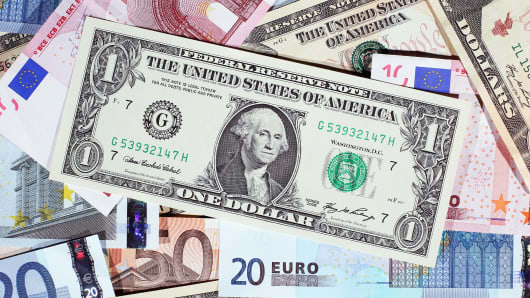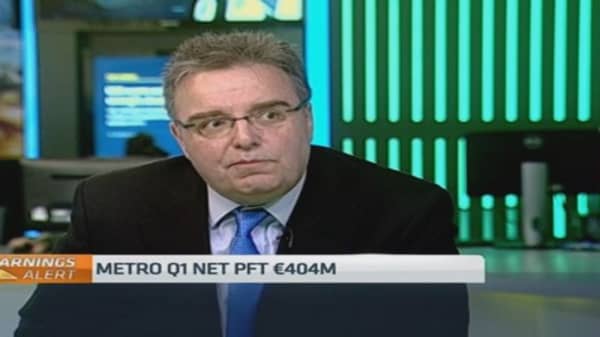In the end, Geithner had to settle for his host's assurances that everything was going to plan, and that the heavily indebted euro area countries were making progress on their structural reforms.
Indeed they were: At the time of that meeting, the Greek economy was sinking at a rate of 6.9 percent, followed by economic downturns of 3.5 percent in Portugal, 2.4 percent in Italy, 1.6 percent in Spain and a continuing economic stagnation in France.
These five countries represent 53.1 percent of the euro area economy, but Germany would not relent in its firm insistence on fiscal retrenchment. For the German Chancellor, these countries' plight was just a case of self-inflicted wounds because "they did not respect the budget rules and failed to supervise their banks."
Read MoreGreek deal odds 'reasonably good': Deutsche Bank co-CEO
That message played well with domestic audience in the run-up to German elections in September 2013. Obviously, it was important to be seen as a stern guardian of German finances bent on protecting taxpayers from southern spendthrifts and fiscal miscreants.
That policy exasperated so much Jean-Claude Juncker to push him into an unheard of attack on German leadership. Currently serving as the president of the European Commission (EU's executive body), Mr. Juncker was Luxembourg's prime minister and the chairman of the Eurogroup (a forum of the euro area finance ministers) when he aired his concerns in an interview to the French daily Le Figaro on July 29, 2012. Here is what he said: "… how can Germany have the luxury of playing domestic politics on the back of the euro? If all other 16 euro area countries did the same thing, what would remain of our common project? Is the euro zone just a branch office of the Federal Republic of Germany?"
NATO's fraying southern flank
Washington, however, dropped the ball. The presidential election campaign was entering its most critical period, and in the late summer of 2012 (two months before the election date) it did not matter what Europeans were doing to themselves.
But now it does.
Having lost a quarter of its output during the financial crisis, the Greek economy weakened again in the fourth quarter of last year, leaving 28.5 percent of its labor force jobless and 50.6 percent of its youth out of the labor market. Italy remains mired in a seemingly intractable recession, with an unemployment rate of 12.9 percent and 42 percent of its young people unable to find a job. France's 0.4 percent economic growth in 2014 marks a third consecutive year of virtual stagnation, with 10.3 percent of its idled labor force last December. Spain and Portugal have been able to eke out some recovery, but that has not made much difference to their deeply depressed labor markets; their respective unemployment rates stood at 23.7 percent and 13.5 percent at the end of last year.
President Obama certainly understood that these would be the consequences of pushing fiscal austerity on recessionary euro area economies. And, as Mr. Geithner observed, the president was "deeply worried" about Berlin's policies because he suspected that they would lead to socio-political changes by forces that could undermine America's all-important Atlantic alliance.
That's what he got now -- while facing an open warfare in the middle of Europe and a rapidly strengthening Chinese influence in Asia-Pacific.
Greece – a NATO member -- is now in the hands of a coalition led by a radical left party. And Greece is of particular importance as a strategic partner in Eastern Mediterranean at a time when an increasingly assertive Turkey (also a NATO member) continues to expand its ties with Russia and with the China-Russia operated Shanghai Cooperation Organization. Washington probably also understands that, if pushed too far, Greece could – for starters -- get more deeply involved with Russia's energy projects, and with China's efforts to complete its Maritime Silk Road to Europe through investments in Greek ports Piraeus and Thessaloniki, and in rail lines going from Greece to Hungary via Macedonia and Serbia.
Investment thoughts
Washington will help the euro by making sure that Greece's already scaled-back demands for debt relief are met. A final solution may not be announced during today's Eurogroup meeting in Brussels, but enough progress has been made for a compromise in the days ahead.
A longer term outlook, however, remains clouded. The euro area management has to change to make possible a more balanced growth and a policy making process compatible with an effective monetary union. But that is impossible without further political integration and significant sovereignty transfers no country seems willing to concede.
Another issue is Europe's security architecture in the wake of the war in Ukraine and a number of frozen conflicts that might flare up any time. Washington neo-cons coalescing around Hillary Clinton's undeclared presidential campaign have got their knives out – they are ready to strengthen the Atlantic alliance as a pillar of the new world order. Wish them luck.
Meanwhile, the growing U.S. economy and a strong dollar will continue to provide a lifebuoy to the beleaguered euro area economy.
Michael Ivanovitch is president of MSI Global, a New York-based economic research company. He also served as a senior economist at the OECD in Paris, international economist at the Federal Reserve Bank of New York and taught economics at Columbia.





